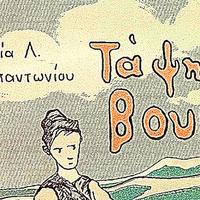76. Ο Γκέκας έκαμε ό,τι έπρεπε
Ο Γκέκας περίμενε να ξαναγίνει ο γάμος της Αφρόδως και την άλλη μέρα. Είχε ροκανίσει τόσα κόκαλα την Κυριακή!
Πήγε στις βλάχικες καλύβες και τη Δευτέρα και την Τρίτη και την Τετάρτη. Είδε όμως πως ο γάμος δε γίνεται κάθε μέρα.
Άμα γύρισε στις καλύβες των παιδιών τη νύχτα, έλαμπε στον ουρανό το στρογγυλό φεγγάρι.
Ο Γκέκας δε γάβγιζε το φεγγάρι, καθώς συνήθιζε, γιατί είχε το βράδυ εκείνο πολλά στον νου του. Κάθισε απέξω από τις καλύβες με το κεφάλι κοντά στην ουρά του και συλλογιζόταν.
«Προχτές ο μπάρμπας μου ο Μούργος κι ο άλλος μπάρμπας μου ο Πιστός κι ο παππούς μου ο Κίτσος κυνήγησαν έναν λύκο... Εγώ τι κάνω ‘δώ; Μόνο παίζω με τα παιδιά. Και καμιά φορά γαβγίζω.
»Μα εγώ είμαι μεγάλος σκύλος τώρα. Κι ένας σκύλος, που μεγάλωσε, δεν πρέπει να τρώει το ψωμί και τα κόκαλα άδικα, όπως εγώ.
»Τα παιδιά δεν έχουν κοπάδια να φυλάξω ούτε άλλη δουλειά μου δίνουν. Δεν έχω κάνει τίποτα!». Ο καημένος ο Γκέκας πολύ στενοχωριέται.
«Να μπορούσα» συλλογίζεται «να τους το πω... Θα κουνήσω αύριο την ουρά μου πολλές φορές μπροστά στον Αντρέα, στον Φάνη και στον Δημητράκη. Βέβαια θα με καταλάβουν».
---
Αυτή τη στιγμή άκουσε κατιτί στις ακρινές καλύβες. Σήκωσε το κεφάλι κι είδε έναν ίσκιο που έφευγε βιαστικός.
Τρία πηδήματα έκανε ο Γκέκας. Ποτέ δεν είχε πηδήσει τόσο μακριά στη ζωή του. Ένα κρα ακούστηκε και μια πνιγμένη φωνή κότας.
Ήταν η αλεπού! Είχε αρπάξει στα δόντια της μια κότα κι έτρεχε.
Όταν η αλεπού άκουσε θόρυβο, υποψιάστηκε πως είναι σκύλος. Τότε άφησε την κότα κι έτρεξε περισσότερο.
Έπρεπε ένας σκύλος να είναι καλός στο τρέξιμο και να βάλει όλα τα δυνατά του για να μπορέσει να τη φτάσει· τόσο πολύ τρέχει μια αλεπού.
Όταν όμως η αλεπού έκανε λίγα πηδήματα, μετάνιωσε και γύρισε έξαφνα πίσω να πάρει την κότα· γιατί τη βρήκε πολύ παχιά.
Έτσι την έπαθε.
Ο Γκέκας την πρόφτασε και την άρπαξε από τον λαιμό. Δε θα την αφήσει! Η αλεπού φωνάζει, δέρνεται, θέλει να δαγκάσει.
Σφίγγει τα δόντια του απάνω της και μουγκρίζει ο Γκέκας. Φωνάζουν οι κότες από το κοτέτσι, τρέχει ο κυρ Στέφανος έξω με το τουφέκι. Ξυπνά ο Αντρέας, ο Δήμος, ο Κωστάκης. Ξυπνούν όλοι.
---
—Το σκοινί! Ένα σκοινί γρήγορα! φωνάζει ο κυρ Στέφανος, όταν είδε στο φως του φεγγαριού πως ήταν η αλεπού! Θέλησε να τη δέσει και κρατούσε το τουφέκι του έτοιμο, μήπως η αλεπού ξεφύγει.
Τα περισσότερα παιδιά ρωτούν:
—Τρώει; Δαγκάνει; Και δεν πλησιάζουν. Πρώτη φορά βλέπουν αγρίμι ζωντανό.
Ο κυρ Στέφανος πέρασε το σκοινί από τα πίσω πόδια της αλεπούς και, καθώς την κρατούσε ο σκύλος από τον λαιμό, προσπάθησε να τη δέσει σφιχτά.
Μα ο Γκέκας είχε τελειώσει τη δουλειά του. Τόσο σφιχτά την είχε πιάσει από τον λάρυγγα την αλεπού και τόσο βαθιά έμπηξε τα μεγάλα του δόντια που την έπνιξε.
Η αλεπού δεν μπόρεσε να ζήσει στο στόμα τέτοιου εχθρού.
---
Έτσι, αφού πάλεψε άδικα, έμεινε ξαπλωμένη και ακίνητη. Τα παιδιά μαζεύτηκαν γύρω της και την κοίταξαν καλά στο φως του φεγγαριού.
Κοίταξαν τα μυτερά της αυτιά, το μυτερό της στόμα, τη μεγάλη της ουρά, που ήταν μακριά όσο το μισό της σώμα.
Αυτό λοιπόν είναι το αγρίμι που τρώει τους λαγούς, που τρώει τα πουλιά στις φωλιές και τις κότες στα κοτέτσια; Να το τέλος του!
—Την κακομοίρα, λέει ο Δήμος. Πού να το 'ξερε πως δε θα γυρίσει πίσω στη φωλιά της.
— Ποιος της είπε να μας φάει τόσες μεγάλες κότες; είπε ο Κωστάκης.
Ο Γκέκας δεν ησύχασε ούτε μια στιγμή. Όλο φυσούσε, όλο έσκυβε και τη μύριζε, σαν να μην πίστευε πως ψόφησε.
Έχει ακούσει από τους γέρους σκύλους πως η αλεπού κάνει κάποτε τον ψόφιο κι ύστερα σηκώνεται και γίνεται άφαντη.
Αν θέλει και τούτη εδώ, ας σηκωθεί! Μα όχι, αυτό δε θα γίνει. Ο Γκέκας έχει κάνει σωστά τη δουλειά του.
—Μπράβο, μπράβο, Γκέκα! του φωνάζουν όλοι και τον χαϊδεύουν.
Πηδά εμπρός τους, τους κοιτάζει στα μάτια και είναι περήφανος όσο κανένας άλλος σκύλος.

